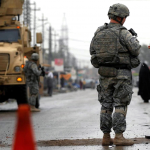The time has come for the United States to challenge Saudi Arabia’s human rights violations and stand for the human rights the US claims to support.
America has, for over 70 years, been in a close alliance with one of the world’s worst human rights abusers, the nation of Saudi Arabia. Since President Franklin Delano Roosevelt initiated the alliance in 1945, the U.S. and the Saudi regime have had a close alliance, economically and militarily.1 Recent Saudi human rights abuses, however, have not lessened US support.2 Indeed, military and economic aid to Saudi Arabia continue as if nothing were amiss.3, 4 It is time for America to use its military aid to Saudi Arabia as leverage for reform within the corrupt regime.
The Problem: Rampant Human Rights Abuse
Although Saudi Arabia is one of America’s few Middle East allies, Saudi Arabia undercuts American values.2, 6 It is highly disturbing that Iran, America’s arch-enemy within the Middle East, has a more democratic government than our closest Arab ally nation.16 As political scientist Mitchell Bard noted, “the Saudis undermine our values. This is a country that practices gender apartheid toward women, discriminates against Jews and Christians and is one of the world’s worst human rights abusers.”6
While ISIS has become the villain of the Middle East, Janine Di Giovanni of Newsweek reported that Saudi Arabia has beheaded more individuals than ISIS has. To make matters worse, sentencing in the Saudi Justice System is discretionary.7 Between January 1 and July 27 of 2016, there were 108 executions, including a mass execution of 47 men accused of terror-related crimes.8 The government has openly suppressed religious freedoms, women’s rights, and freedom of speech. In 2011, the U.S. State Department provided a scathing summary report of Saudi Arabia’s human rights problems,9 but the Obama Administration refused to confront the Saudi regime. The Human Rights Watch joins in the State Department’s Criticism:
Saudi Arabia’s change in leadership in 2015 did not lead to significant human rights changes. Saudi authorities continued to arbitrarily arrest, try, and convict peaceful dissidents. … Authorities systematically discriminate against women and religious minorities. In 2015, Saudi Arabia carried out 158 executions, 63 for non-violent drug crimes. On January 2, 2016, Saudi Arabia executed … prominent Shia cleric Nimr al-Nimr, who was convicted following a deeply flawed trial. On March 2015, a Saudi-led coalition launched an airstrike campaign against Houthi forces in Yemen that included use of banned cluster munitions and apparently unlawful strikes that killed civilians.10
The Solution: Use American Support as Leverage for Reform
On September 22, 2016, the U.S. Senate debated and voted whether to stop a $1.15 billion arms sale to Saudi Arabia in order to rebuke Saudi Arabia’s abuses in Yemen.11 While the bipartisan resolution ultimately did not pass, it illustrates that America is beginning to see that all is not well inside our ally’s borders. This was a step in the right direction. Human Rights Watch reported:
Under the laws of war, the United States… is a party to the conflict in Yemen. As such, the US has a legal obligation to investigate alleged violations of the laws of war in which US forces may have been responsible and appropriate prosecute war crimes that may have been committed. We are unaware of US participation in any investigations of alleged laws of war violations committed in Yemen.12
America should fully investigate the abusive actions of our military ally. As a nation, the US should refuse to tolerate the use of illegal weapons on civilian populations. This is essential if the US wants the international community to take our human rights concerns seriously.7
Moreover, America should institute a partial or complete freeze on US military aid to Saudi Arabia until Saudi Arabia stops its military abuses.5, 13, 14 , 15 Legislators should also consider conditioning military aid on human rights reforms.
America would not be the first to take such an action. In March, the Dutch Parliament voted to ban arms sales to Saudi Arabia in protest of its human rights abuses. Although the Netherlands provides less than $3 million to the nation, America provided over $20 billion during 2015.30, 31 Saudi Arabia’s abuses in Yemen, where half of the military casualties have been civilian, should persuade US lawmakers that it’s time to call for change.
The Right Time for Change
When the new leadership of Saudi Arabia came to power in 2015, America failed to take a stand. As a result, there was no significant human rights improvement. That, however, does not mean that the window for change has closed.5, 13 Indeed, the U.S. still has influence to induce King Salman to bring reforms to his regime.17, 18 Using financial policy as leverage to induce change can induce changes.19 The U.S. has brought positive changes to Saudi Arabia before.20 As Mitchell Bard noted, “the only president to stand up to the Saudis was John Kennedy when he demanded that the kingdom abolish slavery in the early 1960s. And, contrary to the State Department Arabist views that you can’t impose our values on the Arabs, the Saudis complied.”5 Although slavery was viewed as a core doctrine of Islam, reform took place.
Gender equality is perhaps the most dubiously pursued reform, but in spite of historic abuses, Saudi Arabia is indeed showing signs of reform. Women have been allowed onto the Shura Council.20 Support was taken from a Quranic text that opposes abuses against women. In Surat 2:228, the Quran states, “And they (women) have rights similar to those (of men) over them in kindness, and men are a degree above them.”22 Surat 4:19 later states, “Ye are forbidden to inherit women against their will. Nor should ye treat them with harshness, … on the contrary live with them on a footing of kindness and equity.”23 Through wise pressure and negotiation, Saudi Arabia has great potential for women’s rights.
The same is true for freedom of religion and speech. Even the majority Sunni Muslims are calling for reform. “Demonstrators in the Qassim province—an area traditionally known for adhering to a strict Sunni interpretation—also took to the streets in demonstration, thus discrediting the Saudi government’s official line that protests were merely an isolated “Shiite” problem.” 24
What Will America Gain?
If America’s ally were to act as an ally, America would be free from a painful double standard. Previous blank-check support from the US encouraged abuses in the Middle East, yet America has stated that improving human rights is the primary goal for the Middle East.6, 13 Yet even though America says it is dedicated to human rights, it supports abusers. If America does not act, it will continue to be seen as a supporter of oppression among the Saudi people.25 Just as the Glorious Revolution in 1979 destroyed American relations with Iran, any major change in the unstable Saudi government system could take a serious toll on the U.S.-Saudi Arabian alliance.26 Toby C. Jones, a professor at Rutgers University, noted,
The United States, because of its relationship with Saudi Arabia and Bahrain and its apparent preference for preserving the political status quo in the Gulf, is increasingly seen by the region’s citizens as conflated with the violent forces of counterrevolution. Should revolutionaries and would-be revolutionaries in the Gulf force political transitions in the future, the United States could pay a political price for its long-standing military entanglements.13
Unless the United States makes it clear to the Saudi people that we do not supportive abuses, there is danger. As Roberta Cohen from Georgetown University stated,
[W]hat the United States is known and appreciated for around the world is not just its strong economy and military capability. It is its democratic way of life and commitment to the observance of human rights. Our nation defines itself by the Constitution and Bill of Rights, the ending of slavery and segregation, the promotion of equal rights for women, the struggle to end racial and minority discrimination, and the defense of free speech, press, and civil liberties. In its dealings with foreign governments and countries, it must necessarily reflect this identity.27
What Next?
As noted above, America should investigate Saudi Arabia’s wartime abuses and freeze all or part of its military aid to the nation until reforms begin. The risks to such a plan are minimal. Saudi Arabia is competent on their own to fight terror.25, 28 Their economic power through oil is severely limited.5, 29 The rewards are significant. Since America has few true allies in the Middle East, the alliance with Saudi Arabia is far to precious to risk on a long-term basis. American mistakes have ruined our relations with Iran and the people of Bahrain. Let us not repeat our error with our oldest regional ally. In the words of Toby C. Jones,
Given its global reach, the United States will always retain the capacity to project military power, but the terms should be limited. The challenge is less about finding friendly ports to station personnel than it is about charting clearer and more effective terms of political engagement with allies and rivals. And this requires a new strategic doctrine, one that makes clear to regional actors that the era of open security guarantees—which have proven so dear to both Americans and to the hundreds of thousands who have died since the United States began its military build-up—is over. This would not mean the loss of leverage or influence, but in fact the opposite. Once it is clear that the United States is not solely committed to preserving the status quo, regional states will no longer believe they can ignore American calls for reform, restraint, and respect for human rights.13 ■
- Burgen, Peter. March 28, 2014. “Why the Saudis Unfriended the U.S.” CNN, http://edition.cnn.com/2014/03/26/opinion/bergen-obama-saudi-tensions/. (7)
- Gehrke, Joel. March 31, 2014. “Obama refuses to raise human rights issues with Saudis,” Washington Examiner. http://washingtonexaminer.com/obama-refuses-to-raise-human-rights-issues-with-saudis/article/2546504. (9)
- Cordesman, Anthony. March 17, 2014. “The Need for a New ‘Realism’ in the US-Saudi Alliance,” The Center for Strategic & International Studies, http://csis.org/publication/need-new-realism-us-saudi-alliance. (11)
- Bandow, Doug. March 21, 2011. “Riyadh Scores One for Tehran,” Cato Institute, http://www.cato.org/publications/commentary/riyadh-scores-one-tehran. (10)
- Bard, Mitchell. 2011. “Why Doesn’t Obama Call for Democracy In Saudi Arabia?” http://www.mitchellbard.com/articles/obamasaudis.html. (12, 4, 15)
- Bard, Mitchell. 2012. “Uneven exchange with Saudis,” http://www.mitchellbard.com/articles/uneven.html. (6, 13)
- Di Giovanni, Janine. October 2014. “When it Comes to Beheadings, ISIS Has Nothing Over Saudi Arabia,” Newsweek, http://www.newsweek.com/2014/10/24/when-it-comes-beheadings-isis-has-nothing-over-saudi-arabia-277385.html?piano_t=1. (23)
- Human Rights Watch, July 27, 2016, “Saudi Arabia: Over 100 Executions Since January 1: Jordanian Faces Death Penalty for Drug Smuggling,” https://www.hrw.org/news/2016/07/27/saudi-arabia-over-100-executions-january-1.
- U.S. State Department, April 2011, “2010 Human Rights Report: Saudi Arabia,” http://www.state.gov/j/drl/rls/hrrpt/2010/nea/154472.htm. (24)
- Human Rights Watch, “Saudi Arabia,” Accessed 9/23/16, https://www.hrw.org/middle-east/n-africa/saudi-arabia.
- Sifton, John. September 22, 2016, “US Congress Rebukes Saudi Arabia over Yemen: Senators Voice Concerns About Wartime Abuses,” Human Rights Watch, https://www.hrw.org/news/2016/09/22/us-congress-rebukes-saudi-arabia-over-yemen.
- Human Rights Watch, August 19, 2016, “Letter to Secretary Kerry on Trip to Kenya, Nigeria, and Saudi Arabia,” https://www.hrw.org/news/2016/08/19/letter-secretary-kerry-trip-kenya-nigeria-and-saudi-arabia.
- Jones, Toby C., December 22, 2011, “Don’t Stop at Iraq: Why the U.S. Should Withdraw From the Entire Persian Gulf,” The Atlantic, http://www.theatlantic.com/international/archive/2011/12/dont-stop-at-iraq-why-the-us-should-withdraw-from-the-entire-persian-gulf/250389/. (1, 5, 8)
- Juul, Peter. June 2011. “Helping Saudi Women Help Themselves,” Center for American Progress, https://www.americanprogress.org/issues/security/news/2011/06/14/9848/helping-saudi-women-help-themselves/. (27)
- Roth, Ken. May 6, 2012. “Ken Roth’s Advice to President Obama: ‘Intensify Pressure on Russia Before Thousands More Syrians Lose Their Lives,’” Forbes, http://www.forbes.com/sites/rahimkanani/2012/05/06/ken-roths-advice-to-president-obama-intensify-pressure-on-russia-before-thousands-more-syrians-lose-their-lives/. (14)
- Barsocchini, Robert. October 2014. “America’s Saudi Ally ‘Cuts Off More Heads’ than the Islamic State (ISIL),” Center for Research on Globalization, http://www.globalresearch.ca/on-newsweeks-finding-that-a-major-us-ally-cuts-off-more-heads-than-isis/5409133. (25)
- Rosenfeld, Everett, January 2015, “Prince Alwaleed: Oil will never see $100 again,” CNBC, http://www.cnbc.com/id/102363511. (28)
- McDowall, Angus. January 2015. “New Saudi king seeks to reassure on succession and policy,” Reuters, http://www.reuters.com/article/2015/01/23/us-saudi-succession-funeral-idUSKBN0KW0N020150123. (29)
- Council on Foreign Relations. June 2013. “The Global Human Rights Regime,” http://www.cfr.org/human-rights/global-human-rights-regime/p27450. (26)
- Doyle, Chris. October 23, 2013. “Saudi Arabia bows to pressure to reform and grants women the vote,” The Telegraph, http://www.telegraph.co.uk/news/worldnews/middleeast/saudiarabia/8788054/Saudi-Arabia-bows-to-pressure-to-reform-and-grants-women-the-vote.html. (20)
- Lewis, Bernard. What Went Wrong?: The Clash Between Islam and Modernity in the Middle East. (New York: Harper Perennial) 2003.
- Quran, Pickthall, 2:228, “Chapter (2) surat l-baqarah (The Cow),” The Quranic Arabic Corpus, http://corpus.quran.com/translation.jsp?chapter=2&verse=228.
- Quran, Yusuf Ali, 4:19, “Chapter (4) surat l-nisaa (The Women),” The Quranic Arabic Corpus, http://corpus.quran.com/translation.jsp?chapter=4&verse=19.
- Perazzo, Brian. April 22, 2013. “Social Divisions Hinder Saudi Rights Movements,” Al-Monitor, http://www.al-monitor.com/pulse/originals/2013/05/saudi-arabia-human-rights.html. (21)
- Otterman, Sharon. May 2, 2003. “SAUDI ARABIA: Withdrawal of U.S. Forces,” Council on Foreign Relations, http://www.cfr.org/saudi-arabia/saudi-arabia-withdrawl-us-forces/p7739#p10. (17)
- Stakelbeck, Erick. March 5, 2012. “Why the Saudis’ Downfall Could Impact Amercica,” CBN News, http://www.cbn.com/cbnnews/world/2012/March/Why-the-Saudis-Downfall-Could-Impact-America/. (3)
- Cohen, Roberta. 2008. “2008 INTEGRATING HUMAN RIGHTS IN US FOREIGN POLICY: THE HISTORY, THE CHALLENGES, AND THE CRITERIA FOR AN EFFECTIVE POLICY,” Georgetown University School of Foreign Service, http://issuu.com/georgetownsfs/docs/120731162020-b8844e15f9ea464f92fac4352d40eea3/10. (2)
- Hussain, Lubna. January 2014. “Saudi King Salman, New Crown Prince Have Long Battled Al-Qaeda, ISIS,” NBC News, http://www.nbcnews.com/storyline/saudi-arabia-succession/saudi-king-salman-new-crown-prince-have-long-battled-al-n292066. (22)
- Kilian, Lutz. December 1, 2009. “Oil Price Volatility: Origins and Effects,” World Trade Organization, http://www.wto.org/english/res_e/reser_e/ersd201002_e.pdf. (16)
- Ma, Alexandra. March 16, 2016. “Dutch Lawmakers Pass Bill to Ban Arms Sales to Saudi Arabia.” The Huffington Post. www.huffingtonpost.com/entry/netherlands-arms-ban-saudi-arabia_us_56e96cc1e4b0860f99db148e.
- Withnall, Adam. March 16, 2016. “Netherlands Votes to Ban Weapons Exports to Saudi Arabia.” Independent. www.independent.co.uk/news/world/europe/netherlands-votes-to-ban-weapons-exports-to-saudi-arabia-a6933996.html.
Image credit: Flickr/Creative Commons




